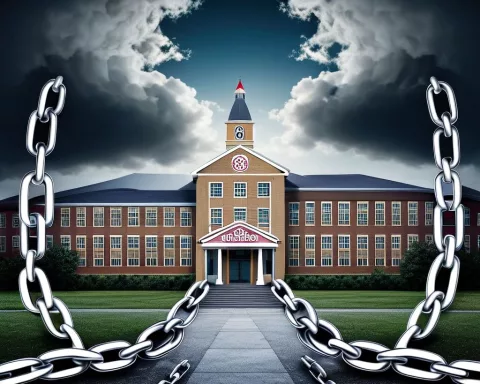Adolescent mental health is in crisis in the Western Cape, South Africa, with a recent study by the University of Cape Town revealing concerning trends in depression and anxiety among young people aged between 10 and 14. The lack of mental health services and awareness of the issue are contributing to the problem. The crisis requires comprehensive mental health support within the school environment to address the root causes identified in the study. The issue is not limited to the Western Cape, and urgent intervention is needed to address the global crisis.
Disturbing Trends in Adolescent Mental Health
A recent study conducted in the Western Cape has revealed concerning trends in adolescent mental health, with a third of participants aged between 10 and 14 reporting depressive symptoms and a further 21% showing signs of anxiety. Limited mental health services and overall unawareness of the issue contribute to the growing crisis which requires comprehensive mental health support within the school environment to address the root causes identified in the study. This is a global crisis that demands urgent intervention.
Disturbing Trends in Adolescent Mental Health
Situated in the heart of South Africa, the Western Cape, known for its picturesque landscapes and rich history, is witnessing an escalating crisis. This crisis, which is largely unseen, pertains to the mental health of its young adolescents and calls for urgent societal intervention.
A study recently conducted by the University of Cape Town (UCT) has brought to light alarming trends in adolescent mental health. Young adolescents, specifically those aged between 10 and 14, are exhibiting significant signs of depression and anxiety. This study was led by Mirriam Mkhize, Claire van der Westhuizen, and Katherine Sorsdahl, who worked in close association with community-based organizations, offering much-needed psychosocial support and mental health counselling in areas with limited resources.
The researchers collected data from 621 adolescents across various primary schools, which revealed a concerning scenario. A third of the participants reported experiencing depressive symptoms, and a further 21% showed signs of anxiety. This data highlights a silently growing crisis which is impacting a substantial segment of the youth population.
The Silent Epidemic and Its Repercussions
Depression and anxiety are debilitating mental conditions that can significantly alter an individual’s life course if not timely addressed. However, due to limited mental health services and overall unawareness or ignorance of these issues, many adolescents’ mental health conditions are left undiagnosed and untreated.
Mirriam Mkhize, in light of these distressing findings, emphasizes the need for comprehensive mental health support within the school environment. She advocates for a focus on the root causes identified in the study, aiming to create a more nurturing and supportive environment in which adolescents can thrive rather than struggle.
The participants experiencing depressive symptoms shed light on some distressing factors contributing to their mental health challenges. These contributing factors included alcohol and drug use, violence among adults in their homes, poor emotional skills, and cannabis use, all of which were linked to the reported anxiety symptoms.
A Global Crisis and a Call to Action
The mental health crisis among adolescents is not limited to the Western Cape or the specific age group studied. The consequences of untreated mental health conditions can be severe, as highlighted by a report from the Western Cape Government on depression, anxiety and adolescent suicide. The report reveals that suicide accounts for 9% of all teenage deaths in South Africa, ranking it ninth globally in terms of suicide rates.
Moreover, the World Health Organisation identifies suicide as the fourth leading cause of death among 15-19-year-olds. This alarming fact underscores the severe mental health crisis faced by young South Africans.
The Mental State of the World 2022 report by Sapien Labs further enhances this concern, placing South Africa at the forefront of countries struggling with mental health issues and highlighting a disturbing downward trend in mental well-being among successively younger generations.
These startling insights serve as a wake-up call, not just for the Western Cape or South Africa, but for the entire world. There is a dire need for comprehensive mental health interventions to address the rising wave of depression and anxiety among adolescents. Key steps towards improvement include providing effective mental health support within schools, raising awareness about mental health issues, and tackling the root causes identified in the study.
The task at hand is monumental, but the goal is clear – to create a world where adolescents can live their lives free from the debilitating burden of untreated mental health conditions. It’s time to take active steps towards changing this narrative, one step at a time.
What is the crisis in adolescent mental health in the Western Cape?
Adolescent mental health is in crisis in the Western Cape, South Africa, with a recent study revealing concerning trends in depression and anxiety among young people aged between 10 and 14. The lack of mental health services and awareness of the issue are contributing to the problem.
What did the recent study on adolescent mental health reveal?
The recent study conducted in the Western Cape revealed concerning trends in adolescent mental health, with a third of participants aged between 10 and 14 reporting depressive symptoms and a further 21% showing signs of anxiety.
What are the repercussions of untreated mental health conditions in adolescents?
Untreated mental health conditions in adolescents can significantly alter an individual’s life course and can lead to severe consequences like suicide. Suicide accounts for 9% of all teenage deaths in South Africa, ranking it ninth globally in terms of suicide rates.
What is the solution to address the crisis in adolescent mental health?
Comprehensive mental health support within the school environment is needed to address the root causes identified in the study. It is necessary to create a more nurturing and supportive environment in which adolescents can thrive rather than struggle.
Is the crisis in adolescent mental health limited to the Western Cape?
The crisis in adolescent mental health is not limited to the Western Cape or the specific age group studied. It is a global crisis, and comprehensive mental health interventions are needed to address the rising wave of depression and anxiety among adolescents.
What are the key steps towards improving adolescent mental health?
Key steps towards improvement include providing effective mental health support within schools, raising awareness about mental health issues, and tackling the root causes identified in the study. It’s time to take active steps towards changing this narrative, one step at a time.












